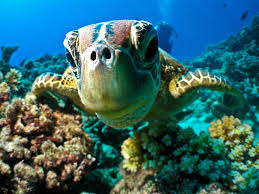
A United Nations conservation agency has made a 35-year deal with Australia to restore the Great Barrier Reef. But in the midst of all this, Austrlian PM, Tony Abbott has announced his hope to become the world’s leading producer and exporter of coal—a well-known contributor to the reef’s decline.
At a meeting on Wednesday in Bonn, Germany, the UNESCO World Heritage Committee accepted Australia’s proposals for curbing several pollution problems affecting the 1,200-mile-long reef that runs parallel to the coastline of the state of Queensland.
The essence of the agreement helps to avert the placement of the reef on a global list of threatened ecosystems, something that has been hovering over the cultural site popular with international and national tourists alike, for over a year. With tourism accounting for $5 billion a year, it’s not something the government should risk.
“What we have seen over the past year, especially the past nine months, is a total turnaround on Australia’s part on the recommendations given in 2014 by the committee,” said Fanny Douvere, of the UNESCO World Heritage Center’s marine program, and technical adviser about the Great Barrier Reef to UNESCO
Australia had committed to reducing agricultural runoff into the reef’s waters by 80 percent before 2025. As part of the recovery program, the government also agreed to an increase in funding by 6.2 million, to monitor the reef, and follow the restoration plan.

Douvere stated “we’re at a moment where the Australian government and civil society agreed that this approach was a good approach. But what matters in the end is that the reef comes back,” suggesting that Australia is finally taking the issue seriously.
Now Australia must make good on the agreement, said, one of several conservation groups that lobbied UNESCO to take action to save the Great Barrier Reef.
Dermot O’Gorman, chief executive of World Wildlife Fund Australia, agrees with the latest achievement. “Last year a government report, produced by some of Australia’s best marine scientists, said the condition of the reef was poor and likely to deteriorate more in the next five years,” he said. “That’s why this this decision by the World Heritage Committee is good: It puts Australia on probation and requires us to go beyond business as usual.” He goes on to say “climate change is a global problem that requires global action,” said Douvere. “But at the level of a threatened site, the only response is to build resilience by reducing the other pressures. So eventually, if there are major threats from climate change like coral bleaching, the ecosystem can respond to that.”
It is the hope of Douvere that the reef’s health is notably better within the next 5 years, 2020 being the critical juncture to establish if the action taken now is already too late. If it is, the reef stands to join other landmarks on the List of World Heritage in Danger.
Get Your Anonymous T-Shirt / Sweatshirt / Hoodie / Tanktop, Smartphone or Tablet Cover or Mug In Our Spreadshirt Shop! Click Here
This Article (Australia agrees to UN deal to save Great Barrier Reef) is free and open source. You have permission to republish this article under a Creative Commons license with attribution to the author and AnonHQ.com.





